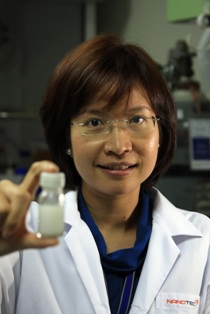Home > Press > Using chitosan core-shell nanoparticle for breast cancer treatment
 |
Abstract:
Researchers at National Nanotechnology Center (NANOTEC) and King Mongkut's University of Technology Thonburi (KMUTT) have successfully developed a target drug delivery system using folate-conjugated pluronic F127/chitosan core-shell nanoparticles to deliver doxorubicin (DOX) to target cancer cells focusing on breast cancer.
Using chitosan core-shell nanoparticle for breast cancer treatment
Pathumthani, Thailand | Posted on May 31st, 2012"DOX is one of the most commonly used chemotherapeutic agents for cancer treatment including breast cancer. However, DOX is also considered a poor soluble drug that is toxic to healthy tissues" said Dr. Nuttaporn Pimpha, a NANOTEC researcher at Hybrid Nanostructure and Nanocomposite. "By using core-shell nanoparticles from folate-conjugated pluronic F127/chitosan we were able to develop a delivery vector that has greater targeting ability, chemical stability and lower cytotoxicity".
As in many developing countries, cancer in Thailand is becoming a significant health problem. Cervix and breast cancer is the leading cause of death in Thai women. The only commercial DOX - encapsulated liposome available is Doxil. However, Doxil has a short half-life in microcirculation and is unstable in the blood stream. Hence there is a need to find a more controlled and stable DOX carrier system.
The researchers reported their work in a paper published by the Journal of Nanomaterials.
####
For more information, please click here
Contacts:
Ramjitti Indaraprasirt
Manager
Public Relations Section
NANOTEC
02-564-7100 ext: 6617
Copyright © NANOTEC
If you have a comment, please Contact us.Issuers of news releases, not 7th Wave, Inc. or Nanotechnology Now, are solely responsible for the accuracy of the content.
| Related News Press |
News and information
![]() Researchers develop molecular qubits that communicate at telecom frequencies October 3rd, 2025
Researchers develop molecular qubits that communicate at telecom frequencies October 3rd, 2025
![]() Next-generation quantum communication October 3rd, 2025
Next-generation quantum communication October 3rd, 2025
![]() "Nanoreactor" cage uses visible light for catalytic and ultra-selective cross-cycloadditions October 3rd, 2025
"Nanoreactor" cage uses visible light for catalytic and ultra-selective cross-cycloadditions October 3rd, 2025
Nanomedicine
![]() New molecular technology targets tumors and simultaneously silences two ‘undruggable’ cancer genes August 8th, 2025
New molecular technology targets tumors and simultaneously silences two ‘undruggable’ cancer genes August 8th, 2025
![]() New imaging approach transforms study of bacterial biofilms August 8th, 2025
New imaging approach transforms study of bacterial biofilms August 8th, 2025
![]() Cambridge chemists discover simple way to build bigger molecules – one carbon at a time June 6th, 2025
Cambridge chemists discover simple way to build bigger molecules – one carbon at a time June 6th, 2025
![]() Electrifying results shed light on graphene foam as a potential material for lab grown cartilage June 6th, 2025
Electrifying results shed light on graphene foam as a potential material for lab grown cartilage June 6th, 2025
Announcements
![]() Rice membrane extracts lithium from brines with greater speed, less waste October 3rd, 2025
Rice membrane extracts lithium from brines with greater speed, less waste October 3rd, 2025
![]() Researchers develop molecular qubits that communicate at telecom frequencies October 3rd, 2025
Researchers develop molecular qubits that communicate at telecom frequencies October 3rd, 2025
![]() Next-generation quantum communication October 3rd, 2025
Next-generation quantum communication October 3rd, 2025
![]() "Nanoreactor" cage uses visible light for catalytic and ultra-selective cross-cycloadditions October 3rd, 2025
"Nanoreactor" cage uses visible light for catalytic and ultra-selective cross-cycloadditions October 3rd, 2025
|
|
||
|
|
||
| The latest news from around the world, FREE | ||
|
|
||
|
|
||
| Premium Products | ||
|
|
||
|
Only the news you want to read!
Learn More |
||
|
|
||
|
Full-service, expert consulting
Learn More |
||
|
|
||








